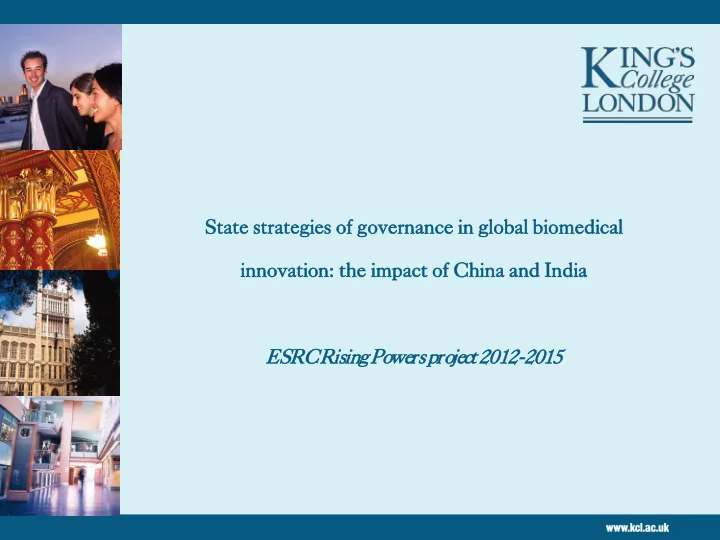

Sta tate str trategie ies of governance in in global l biomedical innovation: the the impact of Chi hina a and In India ESRC Rising P Powers p proj ojec ect 2 2012-20 2015
Aim To examine the nature and impact of China and India’s strategies on the governance of biomedical innovation at national, regional and global levels, and the implications for the UK. Four Case studies: - Regenerative Medicine (Stem cell research, Tissue- engineered wound care) - Stratified/Personalised Medicine (Pharmacogenetics, Bioinformatics) 2
Objectives • What are the primary components and directions of China and India’s innovation and sector-building policies, strategies and actions? • In what ways do these strategies align with or depart from those evident in the developed economies of the UK (and North America, Europe and Japan more broadly)? • To what extent do the national strategies of China and India engage with, challenge or confirm existing regional and global regimes and modes of innovation governance in the bioeconomy? • What are the implications of the answers to the above questions for the UK’s strategies for priority strands of the emerging biomedical economy and health policy? 3
Project Team Core Team Professor Brian Salter, KCL (PI) Dr Alex Faulkner, Sussex University (Co-I) Dr Stuart Hogarth, KCL (Co-I) Dr Yinhua Zhou, KCL (Research Fellow) Ms Saheli Datta, KCL (Project Coordinator and PhD researcher) 4
Project Team and Partners Visiting fellows/project consultants Dr Edison Bicudo, University of Sao Paulo (Brazil) Dr Haidan Chen, Tsinghua University (China) Dr Pierre Delvenne, Universite of Liege Dr Sharmila Sousa, Universidade Federal de São Paulo (Brazil) Dr Neil Stephens, Cardiff University Dr Maki Unemura, Cardiff University (Japan) Partners Professor Pranav Desai, Jawaharlal Nehru University, New Delhi Professor Ramesh, National University of Singapore Dr Wang Ge, Chinese Academy of Science and Technology for Development (CASTED), China Ministry of Science and Technology 5
Method – overview • Phase I (months 1-9) - Establishing the database: identifying, describing and comparing state strategies (national and cross national data sources) • Phase II (months 10-24) - Understanding the inter-state dynamics of medical biotech governance (90 interviews with scientists, industrialists, patient organisations, policy makers) • Phase III (months 3-30) - Cumulative database development, data analysis and theory. • Phase IV (months 1-30) - Impact through policy and public engagement (6 policy workshops and 2 participation events) 6
Outputs • Publications: 1 book, 21 articles • Working papers: 15 • Presentations (core team): 14 (China, India, UK) • Workshops: 6 (China, India, UK) • Teaching: Global Science Policy module, DPE • Networks for future research collaboration • Dissemination and social media 7
Emerging issues - I Markets, hegemony and governance in biomedical innovation • Nature of developed country hegemony in propagation of orthodox model of biomedical innovation • Challenge to this model posed by the emerging global market of pro-active health consumers • Implications for demand side governance in biomedical innovation given the traditional emphasis on supply side governance 8
Emerging issues - II Markets and professional conflict • Emergence of health consumer driven models of biomedical innovation • Creating both economic and political pressures on the orthodox model of biomedical innovation • Enhancing tensions across states between the cultures of science and medicine within the innovation space. • Through a differential professional response to the health consumer interest 9
Emerging issues - III Markets and the dualistic state • States competing for advantage in the hegemonic and counter- hegemonic markets of biomedical innovation • With different positions in and commitments to the current hegemony • And quite different historic infrastructures of governance in biomedical innovation • Adoption by the emerging economies of China and India of ‘state dualism’ in biomedical innovation in order to maximise global market advantage 10
Thank you 11
Recommend
More recommend